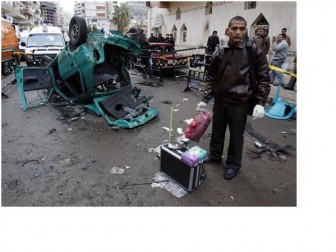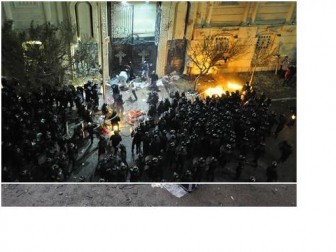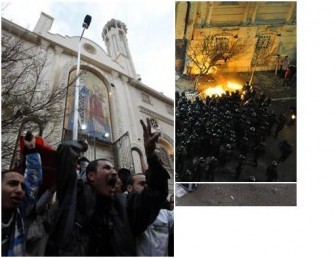ALEXANDRIA, Egypt, (Reuters) – A bomb killed 21 people outside a church in the Egyptian city of Alexandria early today, and the interior ministry said a foreign-backed suicide bomber may have been responsible.
The blast did not originate in any of the cars that were destroyed, a ministry statement said. “It is likely that the device which exploded was carried by a suicide bomber who died among others,” it added.

The circumstances of this and other recent attacks “clearly indicates that foreign elements undertook planning and execution,” said the statement, carried by the official news agency.
The ministry had earlier said the blast, which wounded 43 people as worshippers marking the New Year left the church, had apparently been caused by a bomb in a car parked nearby.
The bombing prompted hundreds of Christians to take to the streets in protest. Some Christians and Muslims pelted each other with rocks, a witness said, and cars were set on fire.
Christians make up about 10 percent of Muslim-majority Egypt’s 79 million people.

Egypt, due to hold a presidential election in September, has stepped up security around churches, banning cars from parking directly outside them, after an al Qaeda-linked group in Iraq issued a threat against the Church in Egypt in November.
The al Qaeda-linked Islamic State of Iraq, which claimed an attack on a church in Baghdad in November, threatened Egypt’s Church over its treatment of women the group said the Church was holding after they had converted to Islam.
“This is a scene from Baghdad,” a witness told Reuters by telephone.
The governor of Alexandria, Adel Labib, “accused al Qaeda of planning the bombing”, state television reported in a brief headline without giving further details.
State television said the investigation was continuing.
Police used teargas to disperse the protest and dozens of officers surrounded the area today to prevent a repeat. Rocks were strewn over the street and windows of parked cars in the area were smashed.

“We sacrifice our souls and blood for the cross,” shouted protesting Christians overnight near the Coptic Orthodox church where the blast struck, a witness said.
Ambulances were at the scene and medical personnel gathered body parts that had been scattered over the area.
Kameel Sadeeq, from the Coptic council in Alexandria, told Reuters: “People went in to church to pray to God but ended up as scattered limbs. This massacre has al Qaeda written all over, the same pattern Qaeda has adopted in other countries.”
An Interior Ministry statement said the blast occurred just after midnight in front of the church after a service to mark the New Year. It said the blast damaged a mosque near the church and eight Muslims were among the wounded.
The official MENA news agency and other state media put the toll at 21 dead and 43 wounded.
President Hosni Mubarak urged Egyptians to stand united in confronting terrorism and called on the authorities swiftly to round up those behind the incident, MENA reported.
Tensions can flare between Muslims and Christians, usually over issues such as the building of churches or relationships between members of the two communities.
Last January, a drive-by shooting of six Christians and a Muslim policeman at a church in south Egypt sparked protests.
In November, hundreds of Christians clashed with riot police, and with some Muslims who joined in, in Cairo in protest against a decision to halt construction of a church. Officials said the Christians did not have a licence to build a church.
Two Christians died and dozens were hurt in the clashes, medical sources said. More than 150 were detained.
Analysts say the state must address grievances such as those over laws making it easier to build a mosque than a church if it wants to stem such sectarian violence.
Officials are swift to play down sectarian differences and were particularly keen to emphasise national harmony after a parliamentary election in November that opposition groups said was rigged, and before the presidential poll in September.
Mubarak, 82 and in power since 1981, is expected to run again, if he is able to. Gallbladder surgery in March revived questions about his health, though he has returned to a full schedule.









